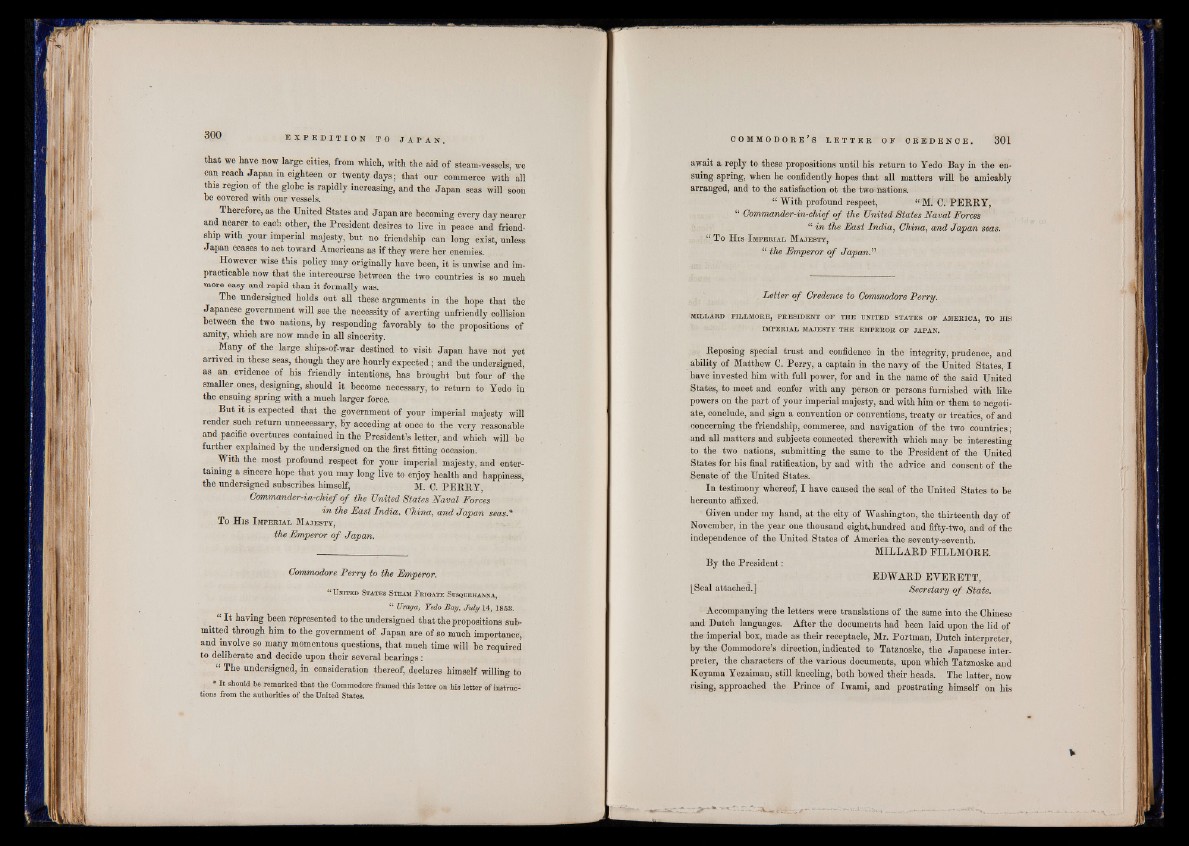
that we have now large cities, from which, with the aid of steam-vessels, we
can reach Japan in eighteen or twenty days; that our commerce with all
this region of the globe is rapidly increasing, and the Japan seas will soon
be covered with our vessels.
Therefore, as the United States and Japan are becoming every day nearer
and nearer to each other, the President desires to live in peace and friendship
with yonr imperial majesty, hut no friendship can long exist, unless
Japan ceases to act toward Americans as if they were her enemies.
However wise this policy may originally have been, it is unwise and impracticable
now that the intercourse between the two countries is so much
more easy and rapid than it formally was.
The undersigned holds out all these arguments in the hope that the
Japanese government will see the necessity of averting unfriendly collision
between the two nations, by responding favorably to the propositions of
amity, which are now made in all sincerity.
Many of the large ships-of-war destined to visit Japan have not yet
arrived in these seas, though they are hourly expected ; and the undersigned,
as an evidence of his friendly intentions, has brought hut four of the
smaller ones, designing, should it become necessary, to return to Yedo in
the ensuing spring with a much larger force.
But it is expected that the government of your imperial majesty will
render such return unnecessary, by acceding at once to the very reasonable
and pacific overtures contained in the President’s letter, and which will be
further explained by the undersigned on the first fitting occasion.
With the most profound respect for your imperial majesty, and entertaining
a sincere hope that you may long live to enjoy health and happiness,
the undersigned subscribes himself, M. C. PERRY
Commander-in-chief o f the United States Naval Forces
in the East India. China, and Japan seas.*
To His I mperial Majesty,
the Emperor o f Japan.
Commodore Perry to the Emperor.
“ U n i t e d S t a t e s S t e a m F r i g a t e S u sq u e h a n n a ,
“ Uraga, Yedo Bay, Ju ly 14, 18S8.
“ I t having been represented to the undersigned that the propositions submitted
through him to the government of Japan are of so much importance,
and involve so many momentous questions, that much time will be required
to deliberate and decide upon their several bearings :
“ The undersigned, in consideration thereof, declares himself willing to
* I t should be remarked that the Commodore framed this letter on his letter of instrno-
tions from the authorities of the United States.
await a reply to these propositions until his return to Yedo Bay in the ensuing
spring, when he confidently hopes that all matters will be amicably
arranged, and to the satisfaction ot the two nations.
“ With profound respect, “ M. C. PERRY,
“ Commander-in-chief o f the United States Naval Forces
“ in the East India, China, and Japan seas.
“ To His I mperial Majesty,
“ the Emperor o f Japan.”
Letter o f Credence to Commodore Perry.
MILLARD FILLMORE, PRESIDENT OP THE UNITED STATES OF AMERICA, TO HIS
IMPERIAL MAJESTY THE EMPEROR OF JAPAN.
Reposing special trust and confidence in the integrity, prudence, and
ability of Matthew C. Perry, a captain in the navy of the United States, I
have invested him with full power, for and in the name of the said United
States, to meet and confer with any person or persons furnished with like
powers on the part of your imperial majesty, and with him or them to negotiate,
conclude, and sign a convention or conventions, treaty or treaties, of and
concerning the friendship, commerce, and navigation of the two countries ;
and all matters and subjects connected therewith which may be interesting
to the two nations, submitting the same to the President of the United
States for his final ratification, by and with the advice and consent of the
Senate of the United States.
In testimony whereof, I have caused the seal of the United States to be
hereunto affixed.
Given under my hand, at the city of Washington, the thirteenth day of
November, in the year one thousand eight, hundred and fifty-two, and of the
independence of the United States of America the seventy-seventh.
MILLARD FILLMORE.
By the President :
EDWARD EVERETT,
[Seal attached.] ; Secretary o f State.
Accompanying the letters were translations of the same into the Chinese
and Dutch languages. After the documents had been laid upon the lid of
the imperial box, made as their receptacle, Mr. Portman, Dutoh interpreter
by the Commodore’s direction, indicated to Tatznoske, the Japanese interpreter,
the characters of the various documents, upon which Tatznoske and
Keyama Yezaiman, still kneeling, both bowed their heads. The latter, now
rising, approached the Prince of Iwami, and prostrating himself on his